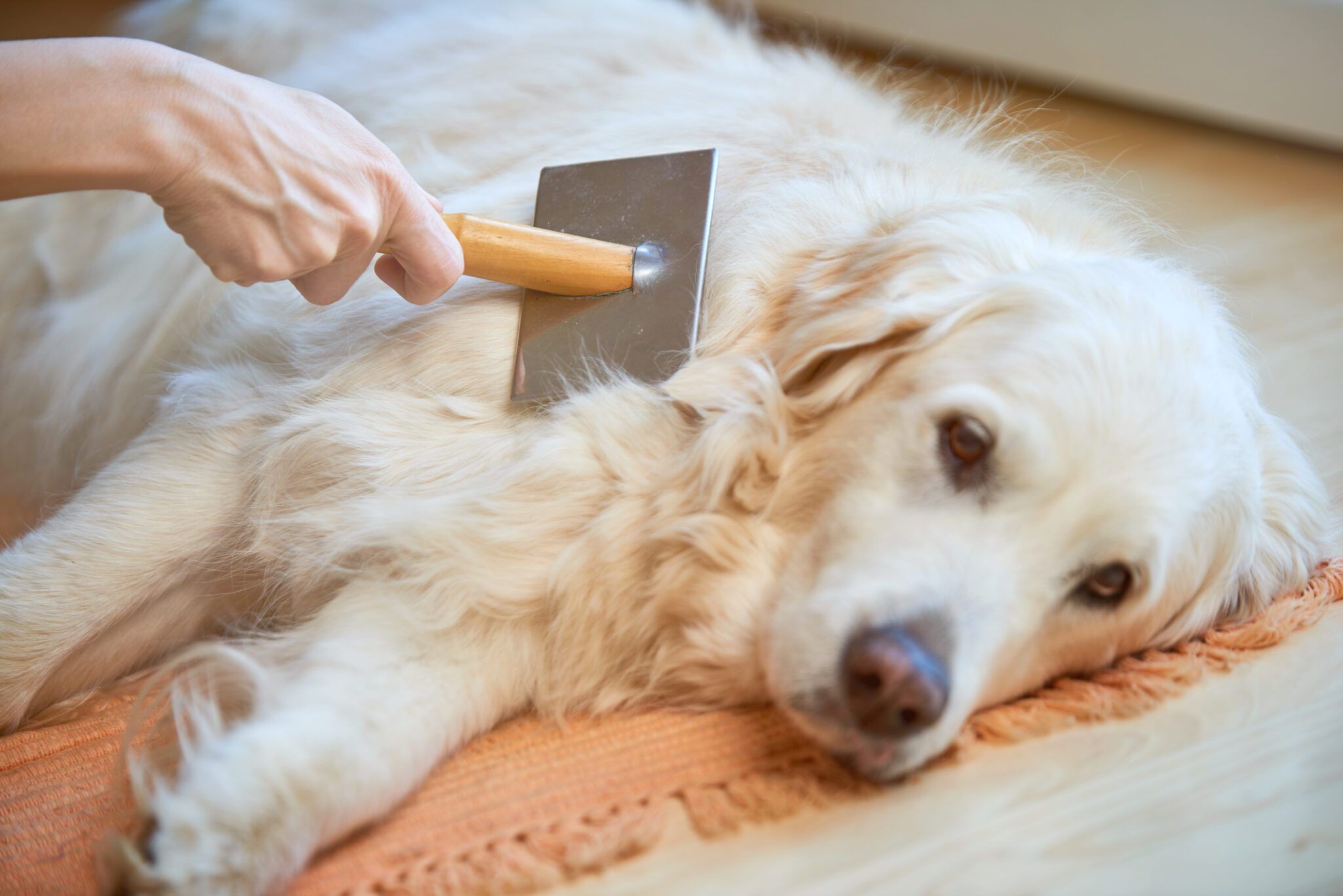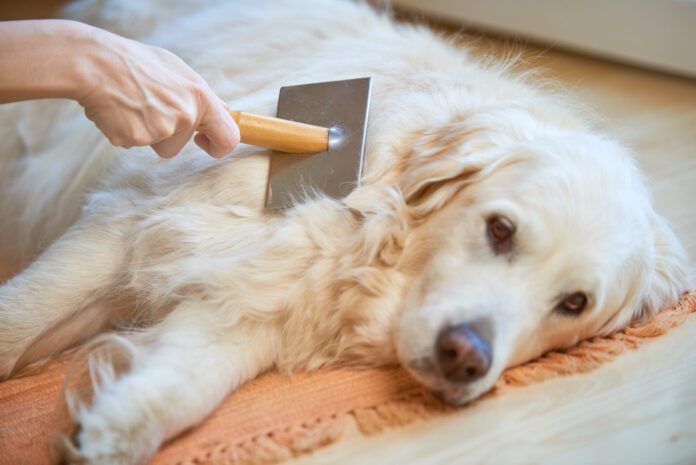Dandruff in dogs isn’t a life-threatening disease, but dry skin flakes are messy, itchy, and unattractive. Worse, they can trigger allergic reactions in humans and signal health problems in your pup. What causes dog dandruff, how can you prevent it, and what can you do to improve your dog’s coat?
Causes of Dandruff in Dogs
Flaking dandruff can be caused by seborrhea, a condition where new skin cells move too quickly to the skin’s surface often accompanied by overactive glands that cause greasy skin. Researchers suspect a genetic connection because the condition is common among certain breeds, like American Cocker Spaniels, English Springer Spaniels, Doberman Pinschers, Dachshunds, German Shepherd Dogs, and West Highland White Terriers.
If your dog’s dandruff outbreaks coincide with dry winter weather, the trigger may be a lack of humidity combined with indoor heating, both of which dry the skin. Too-frequent bathing or the use of harsh shampoos can also cause skin to crack and flake.
Environmental and seasonal allergies can cause or worsen dog dandruff by exposing dogs to pollen and other substances that contribute to dry, flaky, itchy, or inflamed skin. Nutritional deficiencies, including insufficient or poor-quality protein or a lack of Omega-3 fatty acids, have a similar effect.
Itchy paws, flaky skin, and an unpleasant skin odor can also be signs of a yeast infection such as Malassezia. If simple home remedies don’t eliminate dandruff, schedule a vet visit to check for yeast, fungi, mites, or other underlying factors. In some cases, hypothyroidism (an underactive thyroid gland) or auto-immune diseases cause dandruff in dogs.
How to Reduce Dog Dandruff
Gentle daily brushing is an important treatment for your dog’s skin and coat because it stimulates blood flow, promotes natural oil production, and distributes oils throughout the coat.
- Slicker brushes covered with short, tightly packed wire pins angled to avoid skin scratches are recommended for most pups, including long-coated, wire-coated, or curly coated dogs.
- Pinhead or wire-pin brushes with medium-spaced wire pins that may have rubber tips to protect the skin are recommended for most breeds, finishing long coats, smoothing hair, and removing dust and dirt.
- Bristle brushes made with natural or synthetic bristles work well on short-haired dogs and dogs with silky coats.
- Rubber or silicone brushes with short, flexible bristles are also called bath brushes because they can be used to massage shampoo or conditioner into the coat as well as brush short coats between baths.
- Grooming mitts, which are gloves with silicone or rubber ridges or nodules that remove dead hair and smooth the coat, combine grooming with petting, which may help anxious dogs relax and help owners feel closer to their pets while improving their coats. Increasingly popular, grooming mitts or gloves come in a variety of shapes and sizes for left and right hands.
Visit pet supply stores or grooming salons to compare brushes and ask a groomer for advice about which will work best for your dog. Look for a brush with a comfortable handle or ergonomic design that will be easy for you to use. Frequent brushing helps the coat shine, helps prevent tangles and matting, and reduces dandruff.
Improved nutrition changes a dog’s coat, especially when the quality of a food’s protein is upgraded. As explained in How to Find Healthy Dog Food, look for foods that name animal protein sources at the top of the ingredient list. Add fresh foods like eggs, meat, fish, yogurt, or cottage cheese to your dog’s dry food to improve its nutritional content. Try an Omega-3 fatty acid supplement like salmon oil or other fish oil to support the skin’s elasticity, making it less brittle and less inclined to crack or flake. Dehydration contributes to dry skin as well, so help prevent it by placing extra bowls of fresh water in convenient locations for your dog.
Moisturizing shampoos and conditioners relieve flakiness and irritation. Human dandruff shampoos are considered too harsh for pups, but gentle products designed for dogs can make a difference. Oatmeal and aloe vera are popular ingredients, and natural anti-itch sprays or conditioners applied after bathing or between baths help reduce symptoms. Products recommended for dogs with dandruff include
Warren London Dog Shampoo, Buddy Wash Shampoo & Conditioner, 4-Legger Hypoallergenic Shampoo, Pure & Natural Pet Hypoallergenic Organic Conditioner, and Skout’s Honor Probiotic Pet Spray.

